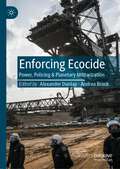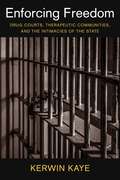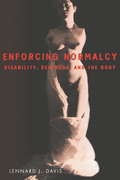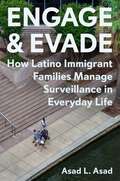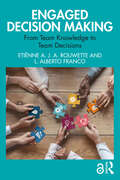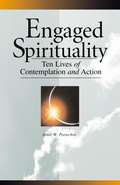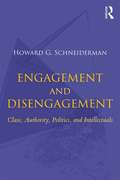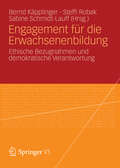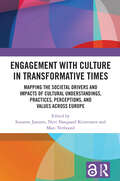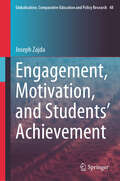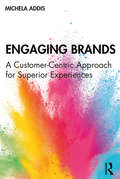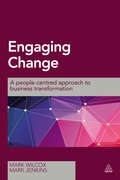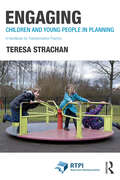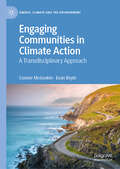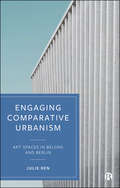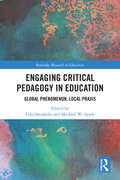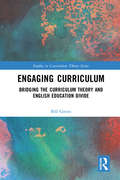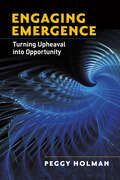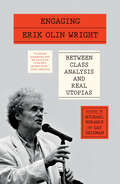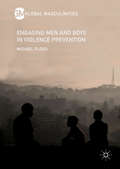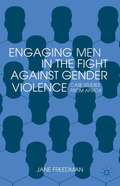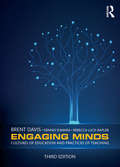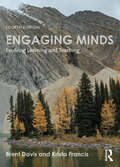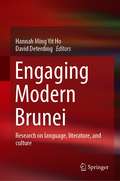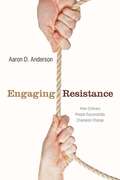- Table View
- List View
Enforcing Ecocide: Power, Policing & Planetary Militarization
by Alexander Dunlap Andrea BrockPolicing and ecological crises – and all the inequalities, discrimination, and violence they entail – are pressing contemporary problems. Ecological degradation, biodiversity loss, and climate change threaten local communities and ecosystems, and, cumulatively, the planet as a whole. Police brutality, wars, paramilitarism, private security operations, and securitization more widely impact people – especially people of colour – and habitats. This edited collection explores their relationship, and investigates the numerous ways in which police, security, and military forces intersect with, reinforce, and facilitate ecological and climate catastrophe. Employing a case study-based approach, the book examines the relationships and entanglements between policing and ecosystems, revealing the intimate connection between political violence and ecological degradation.
Enforcing Freedom: Drug Courts, Therapeutic Communities, and the Intimacies of the State (Studies in Transgression)
by Kerwin KayeIn 1989, the first drug-treatment court was established in Florida, inaugurating an era of state-supervised rehabilitation. Such courts have frequently been seen as a humane alternative to incarceration and the war on drugs. Enforcing Freedom offers an ethnographic account of drug courts and mandatory treatment centers as a system of coercion, demonstrating how the state uses notions of rehabilitation as a means of social regulation.Situating drug courts in a long line of state projects of race and class control, Kerwin Kaye details the ways in which the violence of the state is framed as beneficial for those subjected to it. He explores how courts decide whether to release or incarcerate participants using nominally colorblind criteria that draw on racialized imagery. Rehabilitation is defined as preparation for low-wage labor and the destruction of community ties with “bad influences,” a process that turns participants against one another. At the same time, Kaye points toward the complex ways in which participants negotiate state control in relation to other forms of constraint in their lives, sometimes embracing the state’s salutary violence as a means of countering their impoverishment. Simultaneously sensitive to ethnographic detail and theoretical implications, Enforcing Freedom offers a critical perspective on the punitive side of criminal-justice reform and points toward alternative paths forward.
Enforcing Normalcy
by Lennard J. DavisIn this highly original study of the cultural assumptions governing our conception of people with disabilities, Lennard J. Davis argues forcefully against "ableist" discourse and for a complete recasting of the category of disability itself.Enforcing Normalcy surveys the emergence of a cluster of concepts around the term "normal" as these matured in western Europe and the United States over the past 250 years. Linking such notions to the concurrent emergence of discourses about the nation, Davis shows how the modern nation-state constructed its identity on the backs not only of colonized subjects, but of its physically disabled minority. In a fascinating chapter on contemporary cultural theory, Davis explores the pitfalls of privileging the figure of sight in conceptualizing the nature of textuality. And in a treatment of nudes and fragmented bodies in Western art, he shows how the ideal of physical wholeness is both demanded and denied in the classical aesthetics of representation.Enforcing Normalcy redraws the boundaries of political and cultural discourse. By insisting that disability be added to the familiar triad of race, class and gender, the book challenges progressives to expand the limits of their thinking about human oppression.From the Trade Paperback edition.
Engage and Evade: How Latino Immigrant Families Manage Surveillance in Everyday Life
by Asad L. AsadHow everyday forms of surveillance threaten undocumented immigrants—but also offer them hope for societal inclusionSome eleven million undocumented immigrants reside in the United States, carving out lives amid a growing web of surveillance that threatens their and their families&’ societal presence. Engage and Evade examines how undocumented immigrants navigate complex dynamics of surveillance and punishment, providing an extraordinary portrait of fear and hope on the margins.Asad L. Asad brings together a wealth of research, from intimate interviews and detailed surveys with Latino immigrants and their families to up-close observations of immigration officials, to offer a rare perspective on the surveillance that undocumented immigrants encounter daily. He describes how and why these immigrants engage with various institutions—for example, by registering with the IRS or enrolling their kids in public health insurance programs—that the government can use to monitor them. This institutional surveillance feels both necessary and coercive, with undocumented immigrants worrying that evasion will give the government cause to deport them. Even so, they hope their record of engagement will one day help them prove to immigration officials that they deserve societal membership. Asad uncovers how these efforts do not always meet immigration officials&’ high expectations, and how surveillance is as much about the threat of exclusion as the promise of inclusion.Calling attention to the fraught lives of undocumented immigrants and their families, this superbly written and compassionately argued book proposes wide-ranging, actionable reforms to achieve societal inclusion for all.
Engaged Decision Making: From Team Knowledge to Team Decisions
by Etiënne A. Rouwette L. Alberto FrancoIn the knowledge economy, teams play a central role in decisions made within and across organisations. The reason why teams with diverse compositions are often used is arguably their ability to develop solutions that none of their members could have produced alone. Systems design, strategy and policy development, risk management, and innovation are just a few of the areas that call for team decisions. Unfortunately, a considerable number of behavioural research studies show that teamwork is fraught with difficulties. Teams often underestimate their fallibility, struggle with conflict, or are unable to share and integrate critical information effectively. Indeed, the evidence shows that two out of three teams do not achieve their goals and half of organisational decisions – many of which are team decisions – fail.In this book, the authors draw from research in psychology, decision and systems sciences – as well as their own research and consulting work that spans more than 20 years – to show how designed interventions can enable team decision making to become rigorous, transparent, and defensible. They cover theory and practice regarding the design, delivery, and evaluation of interventions to support team decision making in situations of varied complexity. Written as an applied resource for researchers and advanced students in particular, this book offers a guide to proven interventions that enhance the process of making team decisions and increase the chances of superior team results.The Open Access version of this book, available at www.taylorfrancis.com, has been made available under a Creative Commons Attribution-Non Commercial-No Derivatives (CC-BY-NC-ND) 4.0 license.
Engaged Spirituality: Ten Lives of Contemplation and Action
by Janet W. ParachinThe lives of these ten people teach and inspire us through their stories of deep spirituality and social action that have moved the world.
Engagement and Disengagement: Class, Authority, Politics, and Intellectuals
by Howard G. SchneidermanPart dialogue, part debate between Howard Schneiderman and a small number of social theorists, Engagement and Disengagement represents the culmination of a life’s work in social theory. On the one hand, it is about cohesive social, cultural, and intellectual forces, such as authority, community, status, and the sacred, that tie us together, and on the other hand, about forces such as alienation, politics, and economic warfare that pull us apart. With a blend of humanism and social science, Engagement and Disengagement highlight this two-culture solution to understanding social and cultural history.
Engagement für die Erwachsenenbildung
by Steffi Robak Sabine Schmidt-Lauff Bernd KäpplingerErwachsenenbildung - zwischen ethischer Bezugnahme und demokratischer Verantwortung - beleuchten und diskutieren die AutorInnen die für das Schaffen und Wirken Wiltrud Giesekes zentralen Aspekte Emotion, Kultur, Profession, Beratung, Frauenbildung/Gender und Programm- und Institutionenforschung aus jeweils unterschiedlichen Perspektiven. Die Fortführung der Konstitution und der Ausdifferenzierung des Faches Erwachsenenpädagogik sowie die Sicherung der Institutionen und der dafür notwendigen Professionalität stehen im Mittelpunkt der Beiträge sowohl in realanalytischen, empirischen Fragestellungen als auch in ihrer grundlagentheoretischen Entwicklung.
Engagement with Culture in Transformative Times: Mapping the Societal Drivers and Impacts of Cultural Understandings, Practices, Perceptions, and Values across Europe
by Nete Nørgaard Kristensen Susanne Janssen Marc VerboordAt the heart of this volume are the questions: What does culture mean to European citizens in the face of globalisation, digitalisation, diversity, and social inequality? How do Europeans engage with culture in its various forms, and what societal values are tied to this cultural engagement? These questions are explored in depth across the 15 chapters of this book. By delving into the understandings, practices, perceptions, affordances, and impacts of culture, this book advances the study of the societal values of culture in contemporary European societies, offering insights beneficial to both research and cultural policy work.The book stands out with its five unique features. It embraces an inclusive conception of culture, spanning the arts, popular culture, and everyday cultural practices, both offline and online. It takes a grassroots approach, starting from the cultural understandings and experiences of European citizens. It employs a comparative method involving people from diverse socio-economic groups in nine European countries – with different cultural policy models, social-structural features, socio-cultural value orientations, and media systems. It builds on a multi- and mixed-methods approach, including a large-scale survey, a smartphone study with experimental stimuli, several phases of online content data collection and analysis, qualitative interviews, and focus groups. Finally, it delves into how wide-ranging and interconnected sociocultural transformations such as migration, digitalisation, and social inequality impact people’s understanding of and engagement with culture as well as the meanings and values they attribute to culture. These unique features promise to offer a fresh and comprehensive perspective on cultural engagement in contemporary European societies.The collection showcases the multiple, often contradictory concepts and understandings of culture and its societal values among social groups within and across European societies. The findings call for a “social turn” in cultural policy that extends beyond traditional arts and culture to support diverse cultural expressions that may enhance social values, address complex social issues, and shift the focus from economic objectives to promoting civic solidarity, equity, inclusivity, tolerance, and shared community values.
Engagement, Motivation, and Students’ Achievement (Globalisation, Comparative Education and Policy Research #48)
by Joseph ZajdaThis book analyses discourses of the use of engagement and motivation in schools globally. It focuses on the overall impact of engagement on teachers, students’ motivation, students’ well-being, and standards. It examines the role of engagement and motivation impacting teachers and students in the classroom, and the overall impact of inclusive classroom models to improve their performance in the classroom. The book analyses topics such as cultural identities and engagement, students’ personalities and their impact on learning, the role of intelligence in learning, social learning, engagement in collaborative groups, and teachers’ role in promoting engagement in the classroom. The book contributes in a very scholarly way, to a more holistic understanding of the nexus between globalisation, dominant models of motivation, and students’ engaging learning environments, and their academic achievement.
Engaging Brands: A Customer-Centric Approach for Superior Experiences
by Michela AddisHow can managers design and manage excellent customer experiences that will develop long-term relationships with their customers? This book addresses this key question and explores both the theory developed over the past 20 years and tools to create truly engaging brands. Taking a broad holistic approach, this book brings together current thinking on experiential marketing, brand management, customer engagement, customer well-being and happiness, customer loyalty and emotions, the customer journey map, and big data and combines it into a practical and clear roadmap for brand managers. By integrating these modern perspectives, concepts, research techniques, and operative tools, this book provides a new perspective of marketing management to design and build engaging branding. Using extensive examples from a variety of industries, this book offers a global perspective that will appeal to both advanced students and experienced marketing managers.
Engaging Change
by Mark Jenkins Mark WilcoxAny significant organizational level change initiative is dependent on the engagement of the people working in that organization. Without engagement, change will falter and ultimately fail. Engaging Change goes behind the scenes of change management to help managers, consultants and practitioners understand why some things work and why others don't. Engaging Change addresses current challenges such as how to understand the environmental context driving the need for change; how to initiate and sustain momentum throughout the change programme; how to institutionalize structural and behavioural change; and how to create compelling visions. With case studies from Sony, Nestlé, Redcats (who own La Redoute, for example) and the British Army, the text provides practice-based insights into the realities of leading sustainable change.
Engaging Children and Young People in Planning: A Handbook for Transformative Practice (ISSN)
by Teresa StrachanEngaging Children and Young People in Planning places planners’ skills for engagement with children and young people centre stage by discussing several projects delivered or supported by planning students to young people in the Northeast of England. Urban or town and country planning is a largely unfamiliar concept to children and young people. Moreover, in England, the environment in which young people live, play and go to school is shaped by a local planning process which lacks their input. This book explores the nature of the gap between that planning process and the voice of the younger members of the community, as well as the barriers that impede this engagement. It highlights why an engagement process is beneficial for those young people, for the wider community and for the planning process itself. At a time when our relationship with and impact on, the environment is being re-examined, this book challenges the planning professional to identify, develop and reflect upon the engagement skills that will help to transform planning into a more inclusive practice. It will be of use to scholars and practitioners in urban planning, community planning, engagement and children’s rights, whilst supporting their academic and professional development pathways.
Engaging Communities in Climate Action: A Transdisciplinary Approach (Energy, Climate and the Environment)
by Connor McGookin Evan BoyleThis book focuses on Dingle Peninsula 2030 – an awarding winning example of a transdisciplinary collaboration for sustainability. It provides many useful lessons for researchers and students seeking to build transdisciplinary partnerships for sustainability and climate action. The book follows the PhD journeys of two early career researchers from Energy Engineering and Sociology, working together with community partners, national bodies, and other groups on a regional development project. It outlines the institutional and practical challenges of doing such work and the story, successes, and trials of Dingle Peninsula 2030. This book offers students and researchers an invaluable framework to consider when embarking on inter- or transdisciplinary collaborations. The book follows the authors&’ PhD journeys, critically reflecting on the transdisciplinary approach taken, as well as outlining a practical guide for how to engage communities in climate action and sustainability issues.
Engaging Comparative Urbanism: Art Spaces in Beijing and Berlin
by Julie RenJulie Ren investigates the motivations and practices of making art spaces in Beijing and Berlin to engage with comparative urbanism as a framework for doing research, beyond its significance as a critical intervention. Across vastly different contexts, where universal theories of modernity or development seem increasingly misplaced, she innovatively explores the ways that art spaces employ creative capital to sustain themselves in a competitive urban landscape. She shows how these art spaces are embedded within a politics of aspiration and demonstrates that aspiration is an important lens through which to understand the nature of, and possibilities for, urban change.
Engaging Critical Pedagogy in Education: Global Phenomenon, Local Praxis (Routledge Research in Education)
by Michael W. Apple Fida SanjakdarPresenting cutting-edge research from around the world, this book demonstrates how critical pedagogy is shaped by social-political contexts and ideological constructions of knowledge and power.The edited collection brings together a global author team using critical pedagogy to synthesise political and theoretical ambitions with the complex realities of classroom practice. The book addresses two key questions: what does critical pedagogy look like in educative work with young people around the globe? And how can critical praxis enacted in schools and classrooms push the core tenets of critical pedagogy so that they are more responsive to the complex power relations of the real world? Bringing together chapters that create a nuanced understanding of some of the challenges involved in the intersection of ideologies, systems and institutions, the authors offer a set of resources which respond to claims that critical pedagogy is often little more than emancipatory rhetoric with limited practical application.Spanning almost two decades of pedagogical thinking, practice, outreach, community development and activism, this robust volume will be of great interest to researchers and postgraduate students investigating critical education, curriculum, creative thinking and pedagogies.
Engaging Curriculum: Bridging the Curriculum Theory and English Education Divide (Studies in Curriculum Theory Series)
by Bill GreenExplicitly linking curriculum inquiry to English education via recurring themes of representation, democracy and knowledge, this book is a call for both researchers and practitioners to engage with curriculum, explicitly and deliberatively, as both a concept and a question. The approach is broadly conceptual and constitutes an exercise in theoretical and philosophical inquiry. While deeply informed by North American debates and developments, this book offers a distinctive counterpoint and a strategically ‘ex-centric’ perspective, being equally informed by the curriculum scene in Australia, as well as the UK and elsewhere. Divided into two sections, this book first addresses matters of general curriculum inquiry, while the second turns more specifically to English teaching and to associated questions of language, literacy and literature in L1 education. Green brings the two together through a critical examination of the Australian national curriculum, especially in its implications and challenges for English teaching, and with due regard for the project of transnational curriculum inquiry.
Engaging Emergence: Turning Upheaval into Opportunity
by Peggy HolmanChange is everywhere these days—at times it seems like barely controlled chaos. Yet within this turmoil are the seeds of a higher order. When a new system arises from the ashes of the old, science calls the process "emergence." By engaging it, you can help yourself and your organization or community to successfully face disruption and emerge stronger than ever.In this profound book, Peggy Holman offers principles, practices, and real-world stories to help you work with compassion, creativity, and wisdom through the entire arc of change—from disruption to coherence. You'll learn what to notice, what to explore, what to try, and what mindset opens new possibilities. This work can be challenging but also tremendously rewarding. It enables new and unlikely partnerships and develops breakthrough projects. You become part of a process that transforms the culture itself.
Engaging Erik Olin Wright: Between Class Analysis and Real Utopias
by Michael Burawoy and Gay SeidmanA collection of essays exploring emancipatory social science, inspired by the work of pioneering sociologist Erik Olin WrightErik Olin Wright was one of the most brilliant and world renowned social scientists of our era. He left us in 2019 with an unfinished project - the articulation of class and utopia. Wright's sociological Marxism embarked from an original class analysis, with its trade-mark contradictory class locations, that empirically mapped class structures across the globe. In response to the collapse of communism and the rise of neoliberalism, Wright turned to the premise of class analysis, that is the possibility of socialism.Forsaking Marxism's allergy to utopian thinking, Wright searched the planet for institutions that might sow the seeds of socialism – such as cooperatives, participatory budgeting, basic income grants – institutions that might dissolve racial, gender, and class inequalities by eroding capitalism. His last book How to be an Anticapitalist in the Twenty-First Century, published posthumously in over a dozen languages has become a manifesto for a new world, bringing together and inspiring social movement activists.The essays in this volume pay tribute to his generative theory, his crystalline teaching and his personal warmth. The authors – all close colleagues or former students – wrestle with the relationship between his two expanding research programs, class analysis and real utopias. They burn the candle from either end, all galvanized by Wright's genius and vision to reinvent Marxism.
Engaging Men and Boys in Violence Prevention (Global Masculinities)
by Michael FloodAcross the globe, violence prevention initiatives focused on men and boys are proliferating rapidly. Engaging Men and Boys in Violence Prevention highlights effective and innovative strategies for the primary prevention of domestic violence, sexual violence, and other forms of harassment and abuse. It combines research on gender, masculinities, and violence with case studies from a wide variety of countries and settings. Through the cross-disciplinary examination of these varied efforts, this work will enable advocates, educators, and policy-makers to understand, assess, and implement programs and strategies which involve men and boys in initiatives to prevent violence against women.
Engaging Men in the Fight against Gender Violence
by Jane FreedmanGender-based violence is a global phenomenon which affects millions worldwide. However, despite the increasing attention which is now paid to this violence by policy makers data seem to indicate that these efforts are not having as great an impact as may have been hoped. In all countries of the world, reports of gender-related violence remain elevated, whilst many incidents of such violence probably remain unreported due to fear of stigma or reprisals for those who are victims. One of the problems in tackling gender-based violence has been that for too long men have been ignored as part of the solution. Men are often labelled as perpetrators of violence, but they are perhaps too infrequently considered also as potential victims, or as partners and actors in the fight against violence. Constructions of masculinities are not adequately studied to analyse how dominant forms of masculinities may contribute to cycles of violence, and may also oppress and traumatise men themselves. This volume aims to address critically the issues of men, masculinity and gender-based violence, asking how men can be fully engaged in the prevention of gender-based violence, and how this engagement can strengthen prevention initiatives.
Engaging Minds: Cultures of Education and Practices of Teaching
by Brent Davis Dennis Sumara Rebecca Luce-KaplerEngaging Minds: Cultures of Education and Practices of Teaching explores the diverse beliefs and practices that define the current landscape of formal education. The 3rd edition of this introduction to interdisciplinary studies of teaching and learning to teach is restructured around four prominent historical moments in formal education: Standardized Education, Authentic Education, Democratic Citizenship Education, Systemic Sustainability Education. These moments serve as the foci of the four sections of the book, each with three chapters dealing respectively with history, epistemology, and pedagogy within the moment. This structure makes it possible to read the book in two ways – either "horizontally" through the four in-depth treatments of the moments or "vertically" through coherent threads of history, epistemology, and pedagogy. Pedagogical features include suggestions for delving deeper to get at subtleties that can’t be simply stated or appreciated through reading alone, several strategies to highlight and distinguish important vocabulary in the text, and more than 150 key theorists and researchers included among the search terms and in the Influences section rather than a formal reference list.
Engaging Minds: Evolving Learning and Teaching
by Brent Davis Krista FrancisEngaging Minds: Evolving Learning and Teaching explores the diverse beliefs and practices that define the current landscape of formal education. The revised, updated, and expanded fourth edition of this groundbreaking introduction to current interdisciplinary studies of teaching and teacher education is structured around five prominent "frames" of formal education, together offering an overview of the historical and conceptual influences on educational practice: Early Formal Education – likely emerged alongside the creation of origin myths and the invention of symbol-based writing systems, presenting needs for individuals charged with communicating, interpreting, and maintaining such knowledge; Standardized Education – began to unfold in the 1600s, when public education was invented as a response to the cultural convulsions of industrialization, urbanization, and imperialism; Authentic Education – rose to prominence over the last century as researchers began to untangle the complexity of human cognition; Democratic Citizenship Education – fuelled by civil rights movements of the 1960s, with the realization that schools often contribute to (or at least help to perpetuate) inequities and injustices; Systemic Sustainability Education – an emerging trend, as schools and other cultural institutions find themselves out of step with the transition from a mechanization-focused industrialized society to an ecologically-minded and information-based society. These frames serve as the foci of the five chapters of the book, each with three sections that deal, respectively, with history, epistemology, and pedagogy within the frame. Richly illustrated and designed, additional pedagogical features include multiple strategies to highlight and distinguish important vocabulary in the text, as well as suggestions for delving deeper into a given topic. The fourth edition is also complemented by an online resource, learningdiscourses.com, that provides analyses of more than two thousand discourses on learning in education – including summaries and critiques, along with details on their authorship, their imagery, and their associated discourses.
Engaging Modern Brunei: Research on language, literature, and culture
by David Deterding Hannah Ming Yit HoThis book explores issues shaping and defining modern Bruneian identity. It addresses the research gap regarding Brunei studies in terms of the language, literature, and culture of Brunei which, with its bilingual education, is uniquely positioned at the intersection of the Malay and western worlds. The book analyses the linguistic, literary, and cultural modes that provide the backdrop for modern-day instantiations of local identity, as expressed through printed and online materials, film, art, and social practices. It compares Brunei English and Brunei Malay in the context of the literature and culture of Brunei.Readers will find it useful as an essential resource for academic scholars, university students, and others interested in the study of Brunei Darussalam's language, literature, and culture. It provides critical insights from an insiders' perspective into the local identity of the culturally diverse Bruneian society.
Engaging Resistance: How Ordinary People Successfully Champion Change
by Aaron D. AndersonEngaging Resistance: How Ordinary People Successfully Champion Change offers an empirically based explanation that expands our understanding about the nature of resistance to organizational change and the effects of champion behavior. The text presents a new model describing how resistance occurs over time and details what change proponents can do throughout three engagement periods to effectively work with hesitant colleagues. The book's findings are illuminated by examples of six different resistance cases, embedded in the transformation sagas of two real-world organizations. A fundamental premise of this work is that resistance should not be something to avoid or squash as people work to change their organizations. In fact, resistance can be viewed as a natural, healthy part of an organic process. When engaged properly, resisters can help to improve change efforts and strengthen an organization's overall transformation.
